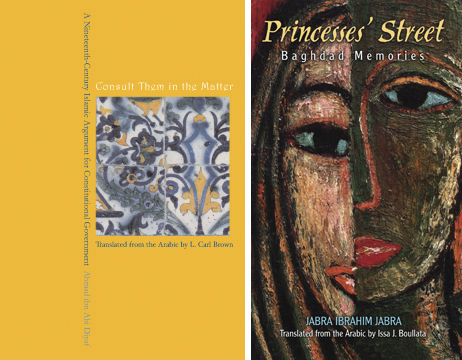Award-Winning Translation of a Middle East History Published

"Consult Them in the Matter: A Nineteenth-Century Islamic Argument for Constitutional Government" and "Princesses’ Street: Baghdad Memories"
FAYETTEVILLE, Ark. — The first place and runner-up books in the 2005 Arkansas Arabic Translation Award competition sponsored by the King Fahd Center for Middle East and Islamic Studies at the University of Arkansas and the University of Arkansas Press are now available. “Consult Them in the Matter: A Nineteenth-Century Islamic Argument for Constitutional Government” (Cloth, $29.95), by Ahmad ibn Abi Diyaf, translated by L. Carl Brown, Garrett Professor in Foreign Affairs Emeritus at Princeton University, won the $5,000 award.
Though written in the 19th century, “Consult Them in the Matter” is a richly contextualized precursor of modern Muslim struggles with notions of democracy and constitutionalism. This work is a translation of the introduction to Bin Diyaf’s lengthy 19th century history of Tunisia that he wrote while serving in his country’s government from the 1820s to 1860s. It was as if a Harry Hopkins, Arthur Schlesinger Jr. or Henry Kissinger had served not just a Roosevelt, Kennedy or Nixon, but all three presidents for an unbroken 40-year period. His ideas have remarkable resonance today, as Muslims and non-Muslims again struggle to comprehend each other’s political ideals and systems.
The second-place book in the competition is Jabra Ibrahim Jabra’s memoir “Princesses’ Street: Baghdad Memories” (Paper $19.95; Cloth $45.00), translated by Issa J. Boullata, former professor of Arabic literature at the Institute of Islamic Studies, McGill University.
This book continues the personal story of Jabra Ibrahim Jabra (1920—1994) that began with “The First Well: A Bethlehem Boyhood” (also published by the University of Arkansas Press and a past Arkansas Arabic Translation Award winner). Jabra was one of the Middle East’s leading novelists, poets, critics, painters, and translators. He was the first person to translate William Shakespeare and William Faulkner into Arabic, and is the writer who is given credit for modernizing the Arabic novel. This book not only helps us understand Jabra as a writer and human being but also his times in post-World War II Baghdad when Iraq was enjoying an unprecedented period of creativity in literature and the arts. But this book is not only about matters of the mind, it is about matters of the heart as well. Jabra beautifully describes his lengthy love affair with a young Muslim woman, the beautiful Lamica, whom he eventually married.
Roger Allen, professor of Arabic at the University of Pennsylvania and a past translator of Jabra and Nobel Prize-winner Naguib Mahfouz, says that Jabra’s memoir “provides a wealth of information and insight on the confrontation and blending of political, social, and cultural principles and ideals that were so much a part of the inter- and post-war period that are the primary focus of this work. There is much to enjoy and much to ponder.”
Contacts
Thomas Lavoie, director
of marketing and sales
University of Arkansas Press
(479) 575-6657, tlavoie@uark.edu